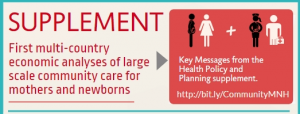
To reach universal health coverage with care at birth and prevent 300,000 maternal deaths and 5.3 million neonatal deaths and stillbirths, an important strategy is to provide home care during pregnancy and postnatally, as well as effective care at birth in clinics and hospitals. Although most countries are implementing home visits, the content of care, cadres, commodities and costs all vary, which affects scaling and sustainability in systems.
The launch of this supplement delivers eight papers, including the first ever multi-country analyses of community maternal newborn care involving large scale evaluations in six African countries including five cRCTS (Ethiopia, South Africa, Tanzania, Uganda, Ghana) and national scale up in Malawi plus a rural, pro-poor programme in Bolivia. Whilst all are cost-effective, the cost per visit and especially for Community Health Worker “kits” varies dramatically. Read a summary of the Twitter chat of the launch >>
The research provides insights into factors driving the scale-ability of community based care for other programmes such as HIV, NCDs and child development or nutrition.
The series involved a 10 year collaboration coordinated by Professor Joy Lawn (London School of Hygiene & Tropical Medicine (LSHTM)), and Emmanuelle Daviaud (Medical Research Council South Africa), working with a group of LSHTM and African economists, plus many partners in the countries including UNICEF, with funding mainly though Saving Newborn Lives/Save the Children.
EDITORIAL
ORIGINAL ARTICLES
- Overview, methods and results of multi-country community-based maternal and newborn care economic analysis
- Community-Based Interventions for Newborns in Ethiopia (COMBINE): Cost-effectiveness analysis
- Improving Newborn Survival in Southern Tanzania (INSIST) trial; community-based maternal and newborn care economic analysis
- Uganda Newborn Study (UNEST) trial: Community-based maternal and newborn care economic analysis
- South-Africa (Goodstart III) trial: community-based maternal and newborn care economic analysis
- Malawi three district evaluation: Community-based maternal and newborn care economic analysis
- Bolivia programme evaluation of a package to reach an underserved population: Community-based maternal and newborn care economic analysis
- Multi-country analysis of the cost of community health workers kits and commodities for community-based maternal and newborn care